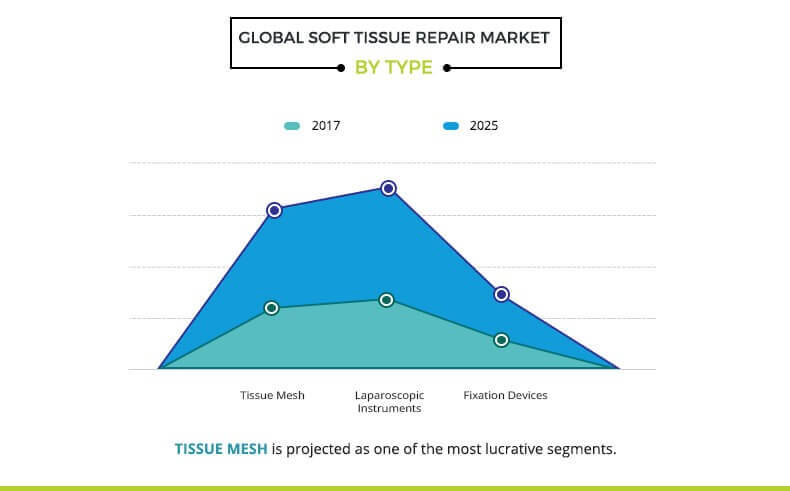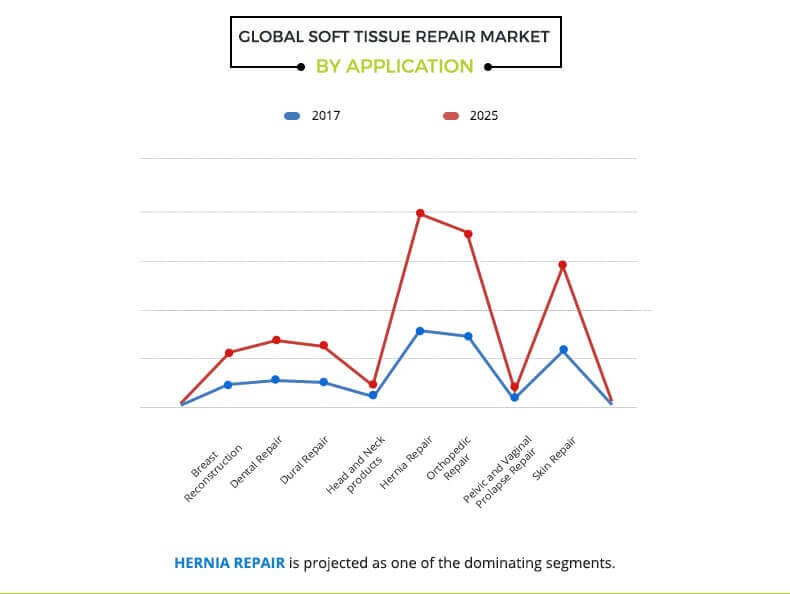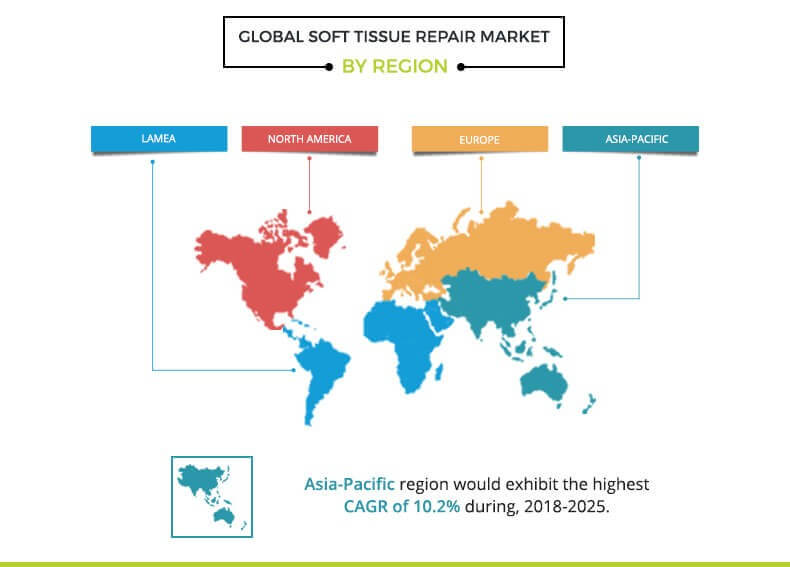Soft Tissue Repair Market Overview:
Soft tissue injuries involve damage to muscles, tendons, and ligaments that result in pain and inflammation. The soft tissue repair process is characterized by replacing the injured or damaged tissues with healthy tissues. The current treatment options rely heavily on surgical procedures, which have a low success rate. Therefore, it is imperative to find superior, technologically advanced alternatives such as minimally invasive procedures and rapid healing products. The global soft tissue repair market was valued at $16,554 million in 2017, and is expected to reach $25,635 million by 2025 at a CAGR of 5.6% during the forecast period.
Factors that drive the global soft tissue repair market are the rise in obese population coupled with the increase in sport-related injuries. However, lack of reimbursement and high cost of these procedures are expected to impede the market growth. Moreover, the launch of novel products in emerging countries is projected to create lucrative opportunities in the market.
The global soft tissue repair market is segmented into type, application, and region. Based on type, the market is categorized into tissue mesh, laparoscopic instrument, and fixation device. Tissue mesh is further divided into biological and synthetic mesh. Biological mesh is bifurcated into allograft and xenograft. Fixation device segment is further divided into suture anchor and interference screw. Based on application, the market is classified into breast reconstruction, dental repair, dural repair, head & neck product, hernia repair, orthopedic repair, pelvic & vaginal prolapse repair, and skin repair. Based on region, it is analyzed across North America, Europe, Asia-Pacific, and Latin America Middle East and Africa (LAMEA).
Type Category Review
In the type category, the tissue mesh segment is expected to remain dominant during the forecast period, owing to the various applications of tissue mesh in dural repair, head and neck repair, hernia repair, breast reconstruction, and dental repair among others. Thus, the increase in usage of tissue meshes, such as biologic mesh and synthetic mesh, is expected to supplement the market growth.
Application Category Review
In the application category, hernia repair dominated the market in 2017 owing to the increase in hernia cases globally. For instance, in the U.S., around 150 thousand incisional hernia repair surgeries are performed every year. Therefore, such increase in cases globally is estimated to create lucrative opportunities for the key market players.
Soft Tissue Repair Market, by Geography
Geographically, North America dominated the global market in 2017, and is expected to retain its dominance throughout the forecast period. This is attributed to the well-established healthcare infrastructure and increased awareness regarding potential benefits of soft tissue repair and the products utilized in the procedures.
The report provides a comprehensive analysis of the key players operating in the global soft tissue repair market. These include Allergan Plc. (LifeCell Corporation), Athersys, Inc., CryoLife, Inc., Integra Lifesciences Corporation, Medtronic Plc., Organogenesis Inc., Stryker Corporation, Zimmer Biomet Holdings, Inc., Smith & Nephew plc., and Becton, Dickinson and Company (C.R. Bard). The other players operating in the value chain are Lifenet Health, Inc., American Medical Systems Inc., U.S. Stem Cell, Inc. (Bioheart, Inc.), Wright Medical Group, Inc., Isto Biologics (Isto Biologics Medical Systems, Inc.).
Key Benefits
- The study provides an in-depth analysis along with the current trends and future estimations of the global soft tissue repair market to elucidate the imminent investment pockets.
- A comprehensive analysis of the factors that drive and restrict the market growth is provided.
- The quantitative analysis of the industry from 2017 to 2025 is provided to enable the stakeholders to capitalize on the prevailing market opportunities.
- An extensive analysis of the key segments of the industry is provided to understand the profitability of the various types of products.
- The key players and their strategies are analyzed to understand the competitive outlook of the market.
Soft Tissue Repair Market Key Segments:
By Type
- Tissue Mesh
- Biological Mesh
- Allograft
- Xenograft
- Synthetic Mesh
- Biological Mesh
- Laparoscopic Instrument
- Fixation Device
- Suture Anchor
- Interference Screw
By Application
- Breast Reconstruction
- Dental Repair
- Dural Repair
- Head and Neck products
- Hernia Repair
- Orthopedic Repair
- Pelvic and Vaginal Prolapse Repair
- Skin Repair
By Region
- North America
- U.S.
- Canada
- Mexico
- Europe
- Germany
- France
- UK
- Italy
- Spain
- Rest of Europe
- Asia-Pacific
- Japan
- China
- India
- Australia
- Singapore
- Rest of Asia-Pacific
- LAMEA
- Brazil
- Turkey
- South Africa
- Saudi Arabia
- Rest of LAMEA
Soft tissue repair Market Report Highlights
| Aspects | Details |
| By TYPE |
|
| By APPLICATION |
|
| By Region |
|
| Key Market Players | Smith & Nephew plc., Stryker Corporation, Athersys, Inc, Becton, Dickinson and Company (C.R. Bard), Integra Lifesciences Corporation, CryoLife, Inc., Allergan Plc. (LifeCell Corporation), Zimmer Biomet Holdings, Inc., Medtronic Plc., Organogenesis Inc. |
Analyst Review
The global soft tissue repair market is expected to grow at a significant rate during the forecast period. This is due to the potential benefits of soft tissue repair products, wherein these stimulate an efficient response, which help produce the mandatory repair material with best quality and in less time. This market is largely fragmented with the focus of several manufacturers on offering advanced applications for customer satisfaction.
Soft tissues are not hardened or calcified tissues but those that help connect, support, and protect the internal organs and other parts of the body. Soft tissues include muscles, tendons, fat, and fascia. Surge in geriatric population, increase in prevalence of obesity, and rise of inactive lifestyle in the populace drive the growth of the soft tissue market. Furthermore, increase in awareness about soft tissue repair products and surge in sports-related injuries are anticipated to boost the market growth during the forecast period.
According to the CXOs, the use of soft tissue repair modalities is the highest in North America, owing to availability of soft tissue repair products, increased awareness, and rise in healthcare expenditure by various government bodies, which is followed by Europe and Asia-Pacific. In addition, orthopedic and medical device manufacturing companies have focused on expanding their presence in the emerging economies, which is anticipated to boost the growth of the market in the coming years.
Loading Table Of Content...





